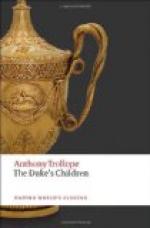himself in his opinion that he had been right, then
would any answer be necessary? He might just
acknowledge the letter, after the fashion which has
come up in official life, than which silence is an
insult much more bearable. But he did not wish
to insult, nor to punish her further. He would
willingly have withdrawn the punishment under which
she was groaning could he have done so with self-abasement.
Or he might write as she had done,—advocating
his own cause with all his strength, using that last
one strong argument,—there should not have
been a ‘moment’. But there would
be something repulsive to his personal dignity in
the continued correspondence which this would produce.
’The Duke of Omnium regrets to say, in answer
to Mrs Finn’s letter, that he thinks no good
can be attained by a prolonged correspondence.’
Such, or of such kind, he thought must be his answer.
But would this be a fair return for the solicitude
shown to her by his uncle, for the love which had
made her so patient a friend to his wife, for the
nobility of her own conduct in many things? Then
his mind reverted to certain jewels,—supposed
to be of enormous value,—which were still
in his possession though they were the property of
this woman. They had been left to her by his uncle,
and she had obstinately refused to take them.
Now they were lying packed in the cellars of certain
bankers,—but still they were in his custody.
What should he do now in this matter? Hitherto,
perhaps once in every six months, he had notified to
her that he was keeping them as her curator, and she
had always repeated that it was a charge from which
she could not relieve him. It had become almost
a joke between them. But how could he joke with
a woman with whom he had quarrelled after this internecine
fashion?
What if he were to consult Lady Cantrip? He
could not do so without a pang that would have been
very bitter to him,—but any agony would
be better than arising from a fear that he had been
unjust to one who had deserved so well of him.
No doubt Lady Cantrip would see it in the same light
as he had done. And then he would be able to
support himself by the assurance that that which had
judged to be right was approved of by one whom the
world would acknowledge to be a good judge on such
a matter.
When he got home he found his son’s letter telling
him of the election at Silverbridge. There was
something in it which softened his heart to that young
man,—or perhaps it was that in the midst
of his many discomforts he wished to find something
which at least was not painful to him. That
his son and heir should insist in entering political
life in opposition to him was of course a source of
pain; but, putting that aside, the thing had been done
pleasantly enough, and the young member’s letter
had been written with some good feeling. So he
answered the letter as pleasantly as he knew how.
’My dear Silverbridge
’I am glad you are in Parliament and am glad
also that you should have been returned by the old
borough; though I would that you could have reconciled
yourself to the politics of your family. But
there is nothing disgraceful in such a change, and
I am able to congratulate you as a father should a
son and to wish you long life and success as a legislator.




